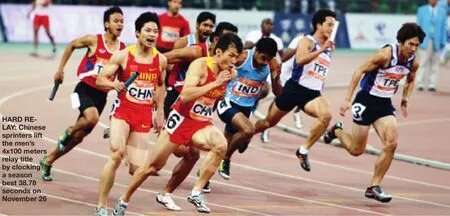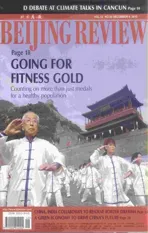Hopes and Challenges
2010-10-14ByYINPUMIN
By YIN PUMIN
Hopes and Challenges
By YIN PUMIN
China tops the medal tally again at the Asian Games but still faces challenges in some events

BASKETBALL VICTORY: China’s basketball team seals the 68-65 victory against Iran at the semifinal and advances to the gold medal game on November 25
The curtain of the 16th Asian Games has fallen, but the 15 days of exciting competitions will be recorded in the history of the Games.
The Games held in Guangzhou, capital of south China’s Guangdong Province, had the most sports ever contested in the Games’59-year history, as it included 28 Olympic and 14 non-Olympic sports that featured 476 events.
A total of 9,704 athletes from 45 countries and regions, 4,983 team of fi cials, 4,191 technical of fi cials and 9,939 journalists congregated for the largest-ever Asian Games.
Three world records were set in weightlifting and archery, together with 12 new Asian records in swimming and cycling.
Chinese weightlifter Li Ping broke the snatch and total world records in the women’s 53-kg weightlifting on November 14, while South Korea’s Kim Woo-Jin scored 1,387 points to beat the 144 arrows quali fi cation round world mark in the men’s individual archery event.
China stayed at the top of the medals table for the eighth successive time at the Asian Games after collecting 199 gold medals, 119 silvers and 98 bronzes in Guangzhou.
“The Guangzhou Asian Games had more events than ever and this is one of the reasons why China finished with so many gold medals,” said Cai Jiadong, Secretary General of the Chinese delegation.
Among the gold medals China won at the Guangzhou Asian Games, 74 came from non-Olympic sports.
“The Asian Games are a testing ground that allows us to prepare for the 2012 London Olympics. It helped us fi nd the right direction and sort out any problems,” said Duan Shijie, Chef de Mission of the Chinese Sports Delegation to the Asian Games. “In some events we still have far to go.”
Powerful sports
China continued its traditional dominance in swimming, track and fi eld, diving,table tennis, badminton and gymnastics in Guangzhou, keeping a stranglehold on many of the titles.
The successful return of star hurdler Liu Xiang boosted the confidence of the delegation. On November 24, the 27-yearold former Olympic champion hurdler Liu stated his recovery from a stunning Beijing Olympics exit by winning the men’s 110-meter hurdles gold with a new Asian record of 13.09 seconds.
Just two days before, Lao Yi, a 25-yearold sprinter, claimed a historic gold in the men’s 100 meters with a 10.24 seconds time,becoming the fi rst “Sprint King” from China at the Asian Games.
On November 26, Lao also led three other young sprinters to lift the men’s 4x100 meters relay title by clocking a season best 38.78 seconds.
“In some events where we have a traditional advantage at the Olympics, such as table tennis, badminton, gymnastics and diving, we also achieved great results with mixed squads of veterans and youngsters,”Duan said.
The young athletes he was referring to,fi rst-time competitors in a multi-sports event of this magnitude, won a total of 127 gold medals.
“They are becoming the centerpieces for many of our national teams,” Duan said.
China made a sensational clean-sweep of all seven table tennis gold medals at the Games and took fi ve golds at the badminton team and individual events. Chinese gymnasts claimed 13 gold medals at 14 events.
After the 5-day competitions from November 22-26, Chinese divers swept all 10 gold medals at stake and 6 silvers.
Hu Yadan, the youngest diver in the Chinese team, grabbed the attention of the

JIANG XIAOYING raucous crowd with some clean entries in the women’s 10-meter platform on November 25. Ranked No.1 in this event, the 14-yearold snatched seven perfect 10s in the fi nal en route to securing her fi rst Asian Games title.
The 1.45 meters tall woman surprised the world with her dexterity when she won a diving Grand Prix event in Madrid, Spain last year and looks to be a strong contender at the 2012 London Olympics.
Apparent problems
However, Duan warned that the Games also highlighted potential stumbling blocks.
“Some of the winning results were far too low compared to the Olympics. Just because we had a successful Asian Games does not necessarily mean we will be bound for success in London,” Duan said.
Duan raised his concerns on specific events like archery, fencing, wrestling, canoeing and track and fi eld, which may be the main route for China to collect gold medals at London.
China ended its fencing campaign with only one individual gold and three gold medals in the six team events, while South Korea won five of the six individual gold medals on offer and collected two gold medals in the team events.
“Many of our team events were also disappointing. Our men’s and women’s soccer teams, as well as the men’s volleyball team,fi nished with one of the worst results at the Asian Games this time,” Duan added. “Our poor performances in the men’s handball and baseball competitions also taught us we have a long way to go in these areas.”
China lost 3-0 to Japan in the opener of the men’s soccer competition, and was stopped by South Korea in the quarter fi nals. The women’s team lost twice to South Korea and once to Japan, finishing without a medal for the first time in the history of Asian Games.
Based on a mature professional league and youth-training systems, South Korea and Japan have gradually become the top two teams in Asia.
Chinese soccer, affected by match-fixing, crooked referees, illegal gambling and dwindling youths pools, has been in its low tide in the past few years.
Wei Di, head of the Chinese Football Association, showed his determination to get the sport back on track since taking the position early this year.
“For Chinese soccer, you cannot count on one day to see its advancement,” Wei said. “Now, priority is to get more and more boys back to the soccer field. We have to build up the groundwork fi rst, then promote the league and the youth-training system.After years of patient work, I’m sure Chinese soccer will have a new look.”
Meanwhile, the men’s team fi nished the worst-ever fifth in the volleyball competition, and seventh in the men’s handball at the Guangzhou Games.
Although China’s men’s and women’s basketball teams kept hold of their gold medals at the Games, there appeared to be some problems.
The young players of the men’s team were involved into a brawl with a Brazilian team in a warm-up match before the Games.
“The young athletes are becoming the centerpiece of every national team. Some of them had showed us how good they are to represent their country, while others had to learn more in the future,” said Duan.
